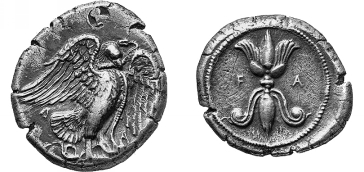The temple tribute, or money used to maintain the building and its services, has its basis in Exodus 30. Every Israelite male 20 years old or older, whether rich or poor (Exodus 30:15), was required to pay the offering if, for nothing else, to avoid a plague from God! The money, however, was originally only collected when a census was carried out.
"When you count the children of Israel, of those who are to be counted, then they shall each man give a ransom for himself to the Lord when you number them so that there may be no plague among them when you number them.
"They shall give this, every one that passes among those who are counted, half a shekel after the shekel of the sanctuary . . . a half shekel shall be the offering of the Lord. Everyone that passes among those who are numbered, from twenty years old and above, shall give an offering to the Lord." (Exodus 30:12 - 14, HBFV throughout).
Judah's King Joash (853 - 796 B.C.) referred to the original collection of a temple tribute in order to justify collecting money to repair and maintain the building (2Chronicles 24:4 - 10).

Monetary support for God's place of worship, on a yearly basis, was likely established during the time of Nehemiah (Nehemiah 10:32). The amount collected, however, was lowered from one-half to one-third of a shekel. In New Testament times, the tribute (called the temple tax) was collected yearly but the amount of money required went back to a half shekel.
Other Support
Tribute money, collected not only from Israelite males, but also from proselytes and slaves, was by far the largest source of revenue for Jerusalem's temple. Other sources of support, however, also contributed vast sums to the treasury.
Besides votive offerings, and the sale of surplus incense, flour, and so on, the people were wont on the Sabbaths and feast days to bring voluntary contributions to the Temple. Another and very large source of revenue was from the profit made by the meat offerings, which were prepared by the Levites, and sold every day to those who made offerings.
Jewish tradition informs us that there must have been quite a race for distinction concerning liberally giving for the temple. The wood, the incense, the wine, the oil, and all other things requisite for the sacred services, as well as golden and silver vessels, were contributed with lavish hand.
Certain families obtained by their zeal special privileges, such as that the wood they brought should always be first used for the altar fire; and the case of people leaving the whole of their fortune to the Temple is so often discussed, that it must have been by no means an uncommon occurrence.
The richest contributions came from those crowded Jewish settlements in Mesopotamia and Babylon, to which 'the dispersed' had originally been transported. Here special treasuries for their reception had been built in the cities of Nisibis and Nehardea, where a large armed escort annually accompanied the 'ambassadors' to Palestine. Similarly, Asia Minor had its central collecting places. In the Temple, these moneys were emptied into three large chests that were opened with certain formalities at each of the three great festival periods.
Expenses
The Temple revenues were in the first place devoted to the purchase of all public sacrifices, that is, those offered in the name of the whole congregation of Israel, such as the morning and evening sacrifices, the festive sacrifices, and so on.
Money given to the temple treasury also defrayed the cost of all necessary services for the sanctuary. All building repairs and maintenance, and the salaries of a large staff of regular officials (such as those who prepared the shewbread and the incense) were paid from this fund.
Those who saw to the correctness of the copies of the law used in synagogues, those who examined the Levitical fitness of sacrifices, those who instructed the priests and so on were also compensated. Lastly, the fees of the Rabbis were also paid from this source of wealth.
The incredible generosity of the people toward the temple cannot be overstated. Even after covering its costs of operation, the treasury paid for the repairs of Jerusalem's walls, roads, public buildings, and so on while retaining immense riches!
Jesus Pays the Tax
Peter, while visiting Capernaum in late 29 A.D., is approached by those who collect the annual temple (tribute) money. After affirming his Master does pay the tax he tells Jesus what happened. The Lord then offers a unique solution to this taxing problem!
"Now after coming to Capernaum, those who received the tribute money came to Peter and said, 'Does not your Master pay tribute?' And he said, 'Yes.' . . .
"'Nevertheless, so that we may not offend them, go to the sea and cast a hook, and take the first fish that comes up; and when you have opened its mouth, you shall find a coin (Greek stater, Strong's #G4715). Take that, and give it to them for Me and you.'" (Matthew 17:24 - 25, 27).
The money that miraculously appeared in the fish's mouth was a silver Greek stater coin. The coin, worth four drachmas or one Jewish shekel, paid for both Jesus' and Peter's temple tribute bill for the year!